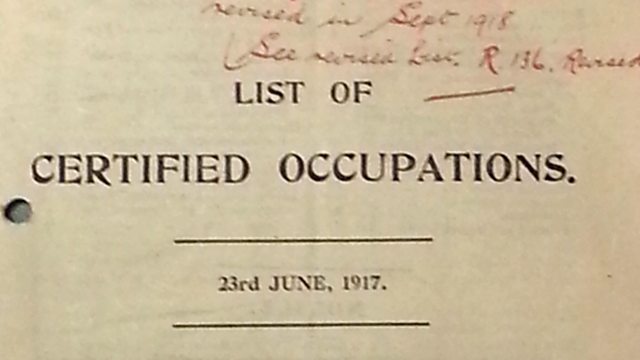Calne, Wiltshire: Reluctant Recruits
Tribunals in Calne for men who refused to fight
A common perception of recruitment during World War One is that hundreds of pals laughingly queued up to enlist. Whilst that might have been true early in the war, by 1916 men were finding reasons not to fight.
Our modern day view of any man’s disinclination to join up is that he must have been a conscientious objector but it’s an assumption that official papers from Wiltshire are blowing apart.
Ivor Slocombe is a historian from Bradford on Avon, who’s been examining official papers from WW1. He says that the demand for men to join the forces was taking its toll on the nation’s capability to wage war.
Once conscription was introduced in 1916, a system of tribunals was introduced. These allowed any man a right of appeal against his call up.
Official records existed until 1921 when the government ordered they be destroyed. However, Ivor says that Wiltshire still has two complete sets: Calne Rural District Council’s tribunal records still exist, as do those of the Pewsey District Council.
“Calne never threw any of their paperwork out” says Ivor. “Pewsey is a little more understandable, as they contracted a local solicitor to clerk their tribunals and so all those records were simply kept in the solicitors’’ strongroom.”
These documents are now kept in the Wiltshire and Swindon History Centre in Chippenham, where Ivor has researched their contents to find the truth behind Wiltshire’s reluctant recruits.
His research reveals that Calne’s tribunal heard 683 cases, involving 317 men. This is because men would often re-appear to appeal after their previous temporary exemption had expired.
Wiltshire’s tribunals heard only 27 cases of conscientious objection; none of these was in Calne. The cases heard in this rural community were much more every day.
Farming is what prompted the majority of appeals. There was an acute shortage of labour on farms at a time when they were being asked to increase production.
Tribunals were made up of local magistrates and worthies, along with a solicitor and a military recruiting officer. The decisions they made were often about people they knew as friends and neighbours. In the case of farming appeals, a criterion of need was established to help clarify rulings.
In February 1917 the government advised on the scale of manpower needed for agriculture. One skilled able-bodied was deemed necessary to look after:
- Each team of horses required to cultivate the land
- Every 20 cows in milk, when assistance of women or boys is available
- Every 200 sheep, exclusive of lambs grazed on enclosed land
- Every 800 sheep running on mountain or hill pasturage
Ivor says his research has revealed an aspect to WW1 which is ignored in textbooks:
“These tribunal records illustrate the need to keep businesses going at home, and the whole range of the home front economy. That’s not really touched on in the textbooks and that’s why it’s important.”
Location: Calne, Wiltshire SN11
Image shows tribunal papers of June 1917
Duration:
This clip is from
Featured in...
![]()
Recruitment & Training—World War One At ���˿���
How the army prepared the nation for conflict
![]()
���˿��� Wiltshire—World War One At ���˿���
Places in Wiltshire that tell a story of World War One
More clips from World War One At ���˿���
-
![]()
The loss of HMY Iolaire
Duration: 18:52
-
![]()
Scotland, Slamannan and the Argylls
Duration: 07:55
-
![]()
Scotland Museum of Edinburgh mourning dress
Duration: 06:17
-
![]()
Scotland Montrose 'GI Brides'
Duration: 06:41







